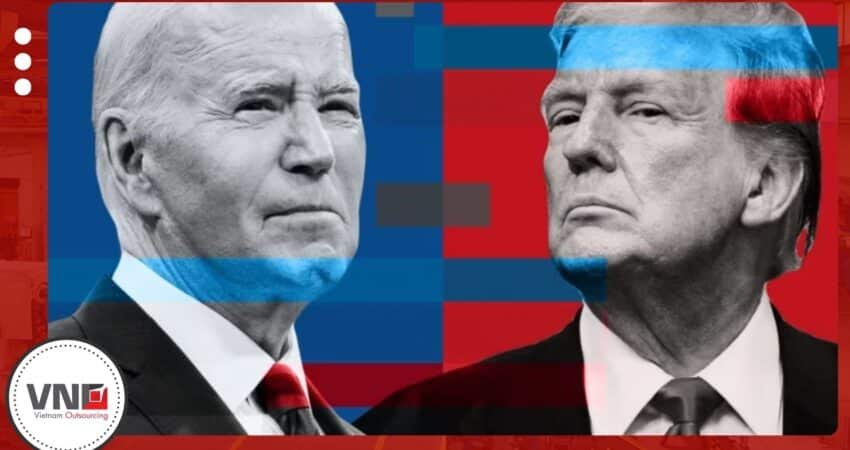- February 28, 2025
- Daniel Pham
Table of Contents
Introduction: The Impact of US Trade Policies on Metal Outsourcing
Metal processing outsourcing to Vietnam is becoming a critical strategy for US and European companies seeking cost-effective, high-quality alternatives to domestic and Chinese suppliers. With Donald Trump’s re-election in 2025 and potential shifts in Biden-era policies, the landscape for metal outsourcing is rapidly evolving.
This article explores how Biden’s and Trump’s trade policies influence Vietnam’s metal processing industry, including tariffs, supply chain regulations, manufacturing incentives, and geopolitical factors. Understanding these policies will help businesses mitigate risks, optimize costs, and make informed outsourcing decisions.
How Biden and Trump Approach Trade and Outsourcing Differently
Biden’s Trade Policies (2021-2024): A Focus on Stability & Trade Alliances
During his presidency, Joe Biden maintained some Trump-era tariffs but adopted a more diplomatic and alliance-driven approach to trade. Key features of Biden’s policies included:
- Tariff Relief Negotiations: Biden did not fully remove Trump’s China tariffs but sought trade agreements to mitigate supply chain disruptions.
- Supply Chain Resilience Act (2022): Encouraged reshoring manufacturing and regional diversification to avoid over-reliance on Chinese suppliers.
- Reinforcing US-Vietnam Trade Relations: Biden’s administration strengthened ties with Vietnam through EVFTA, Indo-Pacific Economic Framework (IPEF), and relaxed export controls.
- Sustainable Manufacturing Focus: Biden pushed for green energy and low-carbon industrial policies, favoring sustainable metal processing methods.
Trump’s Expected Trade Policies (2025 and Beyond): Tariffs and Reshoring Push
Donald Trump’s return to office in 2025 signals a renewed emphasis on tariffs, reshoring US manufacturing, and strict trade negotiations. Some expected policy changes include:
- Higher Tariffs on Chinese Metal Imports: Tariffs on steel, aluminum, and industrial components from China could increase to 35%.
- Aggressive Trade Policy Toward China: Trump’s strategy could include banning certain Chinese imports, making Vietnam an even more attractive alternative.
- America-First Manufacturing Act (Proposed): Pushes corporate tax breaks for US manufacturing, which may impact offshore metal outsourcing.
- Reassessing US-Vietnam Trade Agreements: While Vietnam benefits from Trump’s China tariffs, his administration may push for stricter trade terms with Vietnam.
Why Vietnam Stands to Benefit Under Trump’s 2025 Tariff Policies
With higher tariffs on Chinese goods, US businesses are actively shifting supply chains to alternative markets. Vietnam has emerged as a leading beneficiary, offering lower costs, trade-friendly agreements, and competitive metal processing infrastructure.
Tariffs on Chinese Steel & Aluminum Drive More Outsourcing to Vietnam
| Product Type | Tariff Under Biden (2023) | Expected Tariff Under Trump (2025) |
|---|---|---|
| Steel Imports | 25% | 30-35% |
| Aluminum Imports | 10% | 25% |
| Industrial Components | 15% | 20-25% |
Vietnam’s Competitive Edge in Metal Processing
- Lower Labor Costs: Vietnam’s $3.44/hr vs. China’s $6.50/hr.
- No Major US Tariffs on Vietnamese Metal Exports: Unlike China, Vietnam enjoys more relaxed tariff conditions.
- Trade Agreements Like EVFTA & CPTPP: Provide tariff-free access to major markets.
- Rapidly Growing Metal Industry: Vietnam exported $53 billion in machinery and metal products in 2024, up 18% YoY.
Challenges: Could Vietnam Face Trade Scrutiny Under Trump?
While Vietnam benefits from Trump’s China tariffs, his administration may also take a stricter stance on Vietnam, as seen during his 2017-2021 term.
Possible Trade Risks for Vietnam
- Currency Manipulation Concerns: In 2020, the US Treasury labeled Vietnam a currency manipulator, which could resurface under Trump.
- Stricter Rules of Origin: Trump may impose more conditions on Vietnamese metal exports to prevent China from routing products through Vietnam.
- Higher US Manufacturing Incentives: If Trump expands tax credits for US-based production, it may reduce outsourcing demand.
How US and European Companies Should Adapt Their Metal Outsourcing Strategies
To navigate these policy changes, companies must future-proof their metal processing supply chains by:
- Diversifying Suppliers: Avoid relying solely on China or Vietnam—consider a multi-country approach (Vietnam, Mexico, India).
- Understanding Trade Regulations: Keep up with tariff changes, EVFTA benefits, and new US policies.
- Investing in Sustainable Metal Processing: Biden-aligned businesses may seek Vietnamese manufacturers with green certifications.
- Building Strong Vietnam Partnerships: Secure long-term contracts with ISO-certified metal suppliers to stabilize costs.
- Using Vietnam as a Tariff-Free Export Hub: Take advantage of Vietnam’s preferential trade agreements to export to the EU and other non-tariffed markets.
FAQs About Biden’s and Trump’s Policies on Metal Outsourcing
Will Trump’s new tariffs make metal outsourcing to Vietnam more attractive?
Could Vietnam face trade restrictions under Trump’s 2025 administration?
How do Biden’s and Trump’s policies affect metal processing costs?
Biden’s policies promote stable trade but focus on green energy, increasing sustainability costs.
Trump’s policies favor higher tariffs on China, making Vietnam a lower-cost outsourcing destination.
What should businesses consider when outsourcing metal processing to Vietnam?
Will the US impose tariffs on Vietnamese metal exports?
Conclusion: Navigating US Trade Policies for Smarter Metal Outsourcing
Both Biden and Trump’s policies shape Vietnam’s role in global metal outsourcing, but in different ways:
Biden’s administration focuses on trade stability and sustainable manufacturing.
Trump’s return could bring higher tariffs on China, increasing Vietnam’s attractiveness as an outsourcing hub.
To stay competitive, US and EU businesses must adapt their metal processing strategies, build strong supplier networks, and anticipate future trade shifts.
🔹 Looking for a reliable metal processing partner in Vietnam? Contact us today for supplier recommendations and cost analysis!


